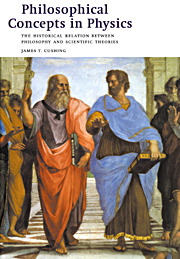 Philosophical Concepts in Physics
Philosophical Concepts in Physics Book contents
- Frontmatter
- Contents
- Preface
- Copyright acknowledgments
- PART I The scientific enterprise
- PART II Ancient and modern models of the universe
- PART III The Newtonian universe
- PART IV A perspective
- PART V Mechanical versus electrodynamical world views
- PART VI The theory of relativity
- PART VII The quantum world and the completeness of quantum mechanics
- PART VIII Some philosophical lessons from quantum mechanics
- PART IX A retrospective
- 25 The goals of science and the status of its knowledge
- Notes
- General references
- Bibliography
- Author index
- Subject index
25 - The goals of science and the status of its knowledge
Published online by Cambridge University Press: 05 June 2012
- Frontmatter
- Contents
- Preface
- Copyright acknowledgments
- PART I The scientific enterprise
- PART II Ancient and modern models of the universe
- PART III The Newtonian universe
- PART IV A perspective
- PART V Mechanical versus electrodynamical world views
- PART VI The theory of relativity
- PART VII The quantum world and the completeness of quantum mechanics
- PART VIII Some philosophical lessons from quantum mechanics
- PART IX A retrospective
- 25 The goals of science and the status of its knowledge
- Notes
- General references
- Bibliography
- Author index
- Subject index
Summary
So far in this book we have studied several major advances in the history of physics. We can now look back and ask what the relation of physics to the other natural sciences is and attempt to draw some lessons about the nature of science and how it operates. For example, what are the hallmarks of science and what, if anything, makes scientific knowledge different from other types of knowledge? The traditional view of science, supported by nearly all scientists and by many philosophers of science, has been to treat the scientific knowledge finally arrived at as being valid largely independently of the details of how it was obtained, as long as it passes the scrutiny of logical analysis and agreement with further observations. Such a position has been called into question by a considerable body of recent work in the history and philosophy of science. We did touch on certain sociological or public aspects of science in our historical presentation of the formulation of quantum theory in Chapter 19. In this chapter we focus on attempts to identify a strictly rational side of science and to reconcile this with the larger social context within which science functions. We use physics as our prototypical science and also discuss at some length the views of Albert Einstein on reality, on a theory of knowledge and on the method and goals of science. Our first task is to delimit certain features of physics for consideration.
- Type
- Chapter
- Information
- Philosophical Concepts in PhysicsThe Historical Relation between Philosophy and Scientific Theories, pp. 359 - 377Publisher: Cambridge University PressPrint publication year: 1998
